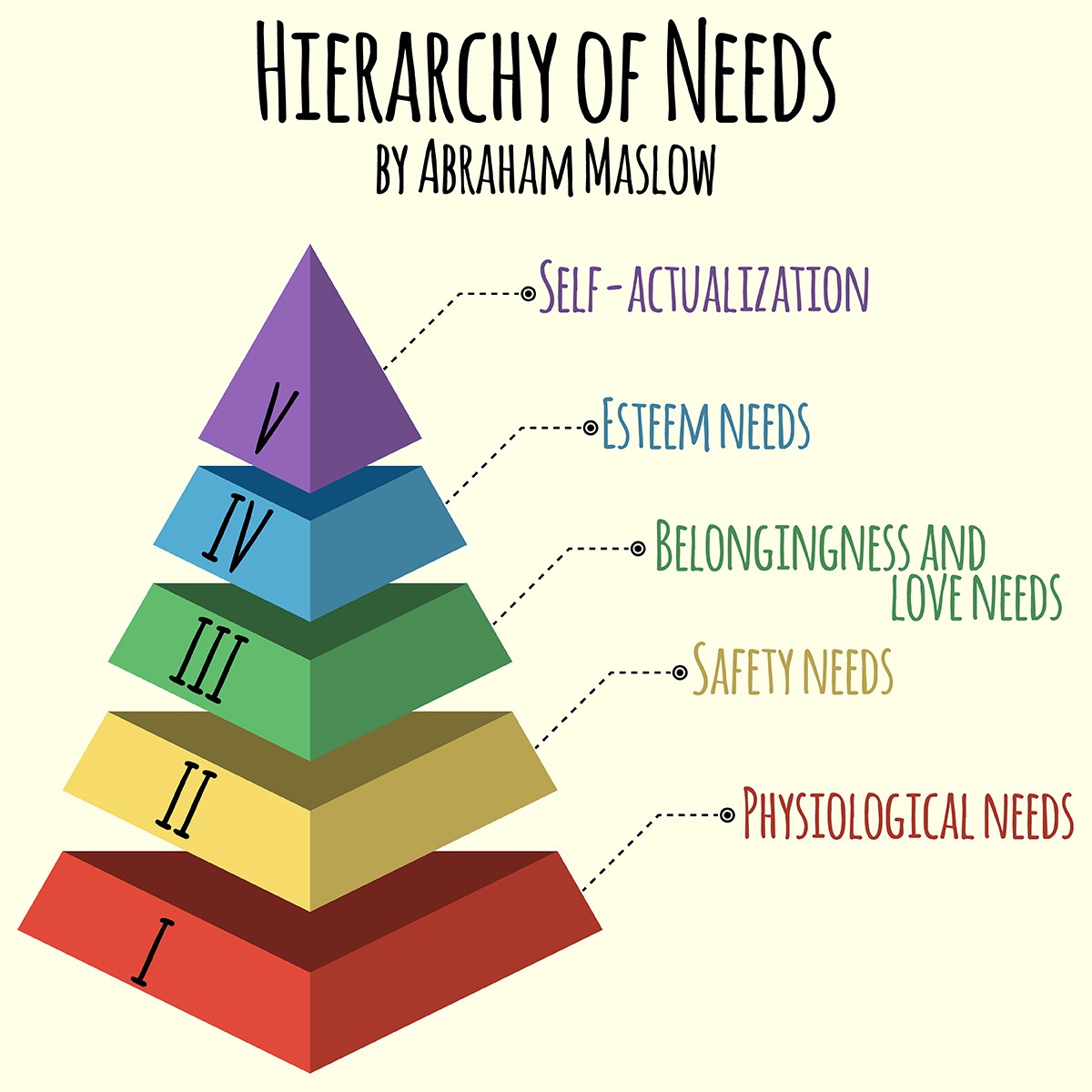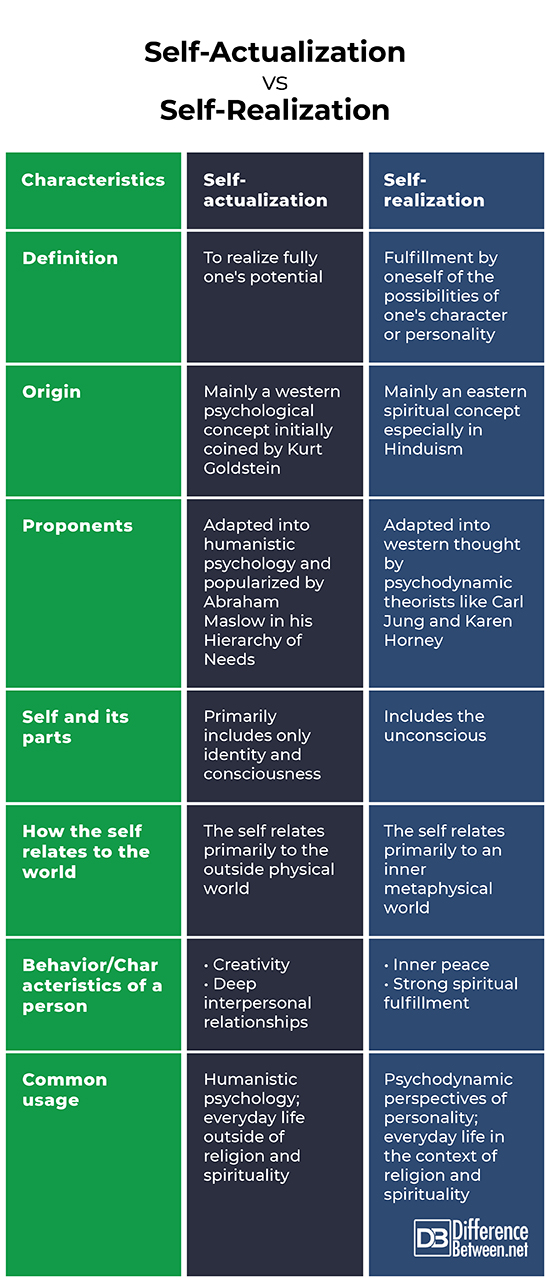Difference Between Self Actualization and Self Realization
Self-actualization and self-realization are two concepts in psychology, philosophy and spirituality that refer to the achievement of the possibilities and potentials of the self. Both terms may mean the goal or motivation that drives a human being, the process of achieving one’s potentials, or the state achievement of said potentials. In psychology, the two terms are sometimes used together interchangeably and mean the same with only subtle differences. Even the dictionary meanings of the two terms are confusingly similar. When differentiated, the two terms are still used together as different steps in the process of achieving one’s full potential.
The difference between the two lies mainly on how the “self” is conceptualized or how it is understood with reference to the world. This difference in conceptualization mirrors the origins of the two concepts. This is also reflected in the aspect of life where each concept is commonly used; science as opposed to religion and spirituality. Furthermore, there are differences in the characteristics of a self-actualized versus a self-realized person. These differences between the two concepts are discussed further below.
What is self-actualization?
Self-actualization is defined in psychology as the motive or drive to realize one’s full potential. It is used in various ways by theorists within the humanistic psychology movement; hence it is commonly understood as a humanistic concept. The concept was first introduced and explored by German neurologist and psychiatrist Kurt Goldstein.
Carl Rogers considers self-actualization as an ongoing process throughout a person’s life. The term was eventually adopted and popularized by American psychologist Abraham Maslow as the highest in the hierarchy of needs in his theory of human motivation. Maslow describes it as a “desire for self-fulfillment”, a tendency to actualize potential, becoming more and more what one is. He gives as examples the need of an artist to create his chosen art, an athlete to be the best in his field, or a mother to achieve her ideal of motherhood. Maslow describes self-actualizing people mainly as being creative, and having deep interpersonal relationships; among their many characteristics.
What is self-realization?
Self-realization is the process and the goal of realizing one’s character or personality and the resulting full knowledge of one’s self and achievement of one’s potential. This concept traces its roots to eastern philosophy, religion and spirituality, particularly the various philosophies and beliefs from India. Here, the term ‘Self’ is used as a metaphysical concept and that it relates primarily to the metaphysical or spiritual world. In these traditions, the Self is equated or related to divinity and self-realization may mean the same as enlightenment, illumination, awakening, and others. Self-realized individuals are said to have inner peace and a strong spiritual fulfillment.
Although the term is still more popularly used today as how it is conceptualized in eastern traditions, the term found its way to the writings of western philosophers. It is most evident in the psychodynamic perspectives of personality where the mystical aspects are removed, but the concept still retains some metaphysical and spiritual quality in that the self still relates to an inner world and the achievement of a ‘whole’ self. Carl Jung coined the term individuation as the condition of psychological well-being which is achieved through the process of self-realization, integration of the opposite aspects of the self, especially the conscious and unconscious. Individuation and self-realization have come to mean the same thing through the years. Karen Horney views self-realization as the fulfillment and use of one’s maximum potential and it is this view that Abraham Maslow based his concept of self-actualization.
Difference between Self-Actualization and Self-Realization
Definition
Self-actualization is the motive or drive to realize one’s full potential while self-realization is the process of fully realizing one’s personality.
Origin
Self-actualization is mainly a western concept originally coined by Kurt Goldstein while self-realization traces its roots to eastern concepts, particularly Indian philosophy.
Proponents
Self-actualization is used by humanistic psychologists specifically by Abraham Maslow and Carl Rogers while self-realization is used mainly by psychodynamic theorists like Carl Jung and Karen Horney.
Self and its parts
In self-actualization, the self is viewed only in terms of identity and the consciousness. In self-realization, the self includes the unconscious.
How the self relates to the world
In self-actualization, the self relates to the outside physical world, in creating things and relating to other people. In self-realization, the self relates more to an inner world, in realizing potential and in achieving the completeness of personality.
Behavior/Characteristics of a person
A self-actualized or actualizing person is creative and has deep interpersonal relationships while a person who achieved self-realization has inner peace and has a strong spiritual fulfillment.
Common usage
Self-actualization is commonly used in humanistic psychology as well as everyday life while self-realization is used in psychodynamic perspectives of personality and spiritual or religious conversation.
Self-Actualization vs Self-Realization
Summary
- Self-actualization and self-realization both refer to the achievement of one’s self.
- Self-actualization refers to the achievement of one’s potential while self-realization refers to the achievement of one’s personality.
- Self-actualization is a western concept and is now mainly used in humanistic thought
- Self-realization traces its roots to eastern philosophy and thought and has found its way to the western world as a psychological concept but still retains its spiritual aspect.
- The self in self-actualization is a conscious self and it relates mainly to the outside physical world.
- The self in self-realization includes an unconscious and operates in and relates to an inner metaphysical world.
- Difference Between Hematoma and Melanoma - February 9, 2023
- Difference Between Bruising and Necrosis - February 8, 2023
- Difference Between Brain Hematoma and Brain Hemorrhage - February 8, 2023
Search DifferenceBetween.net :
1 Comment
Leave a Response
References :
[0]Image credit: https://cdn.lifehack.org/wp-content/uploads/2018/03/12063108/Maslows-Hierarchy-of-Needs-.jpg
[1]Image credit: https://miro.medium.com/max/2400/1*qYmNPPrues2sj8cAgxB_Ag.jpeg
[2]Benoit, Hubert, and Graham Rooth. Self-Realization: And the Journey Beyond Ego. East Sussex, UK: Sussex Academic Press, 2015. Print.
[3]Green, Christopher D. Classics in the History of Psychology. August 2000. http://psychclassics.yorku.ca/Maslow/motivation.htm#f8 (accessed August 21, 2019).
[4]Schultz, Duane, and Sydney Ellen Schultz. Theories of Personality. Belmont, CA: Wadsworth, 2009. Print.




Thanks for this!
Of course right on as far as actualization…and missed the mark on realization. Of course because this is psychology and it can only go so deep to the truth.
Only a spiritual approach/perspective properly defines realization, currently ala non-dualism.